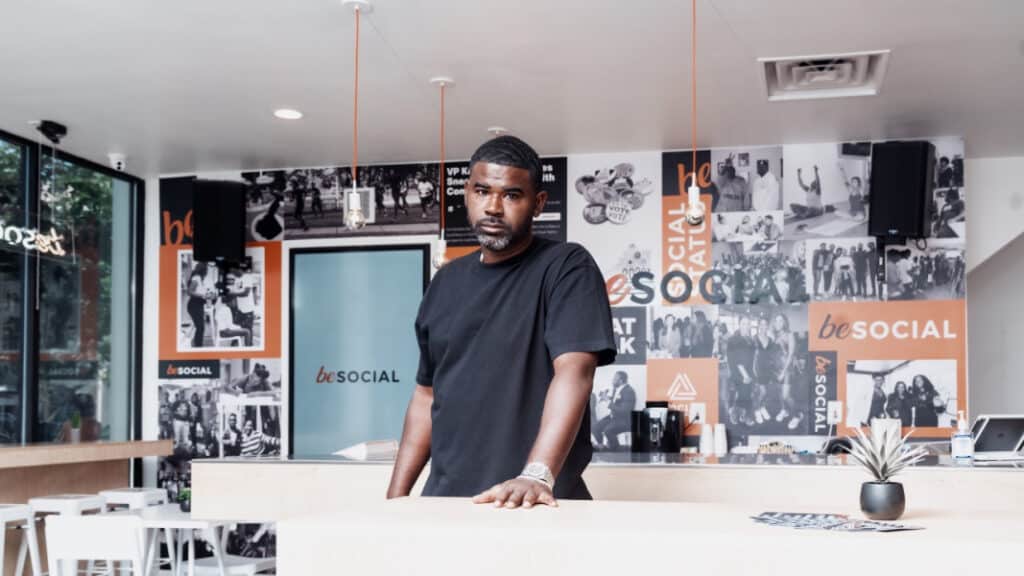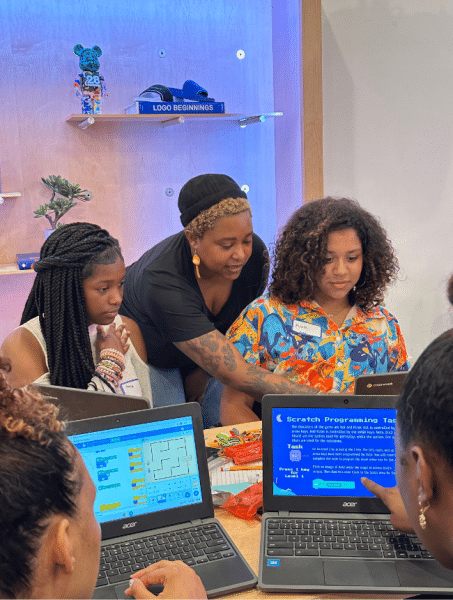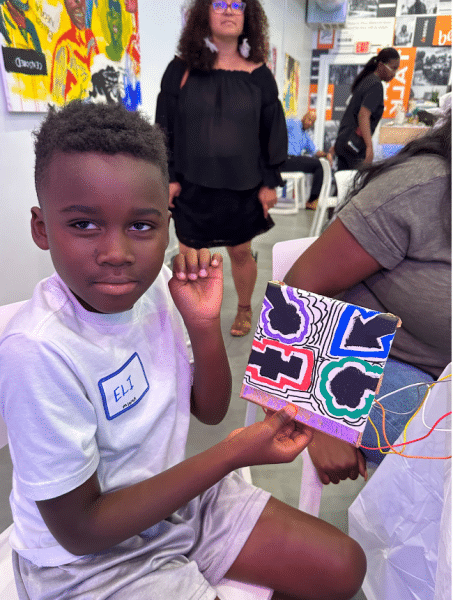STEM has Style
Miranda Volborth
STEM educators and fashion entrepreneurs team up to change perceptions of computing and engineering through ‘TechArts and Crafts’ workshops

Computing has always had an image problem.
“We’re nerds,” said Shaundra Daily, the Cue Family Professor of the Practice of Electrical and Computer Engineering at Duke University and the education and workforce director for the Athena AI Institute. “And I’m okay with that, but not everyone thinks it’s as cool as we do.”
But now, in partnership with one of the coolest independent retailers out there—the Whitaker Group, whose brands include A Ma Maniére, Social Status, A.P.B, Prosper, Jaide and others—Daily is signaling that computing and engineering has entered a young, fun and more inclusive era.

James Whitner, owner and founder of the Whitaker Group
“I met the owner of the Whitaker Group last year, and they had this really awesome philosophy that centers the community,” said Daily. “Manyof their Social Status retail locations housea ‘beSocial’ event space. The idea is that anyone in the community can use the space, but the event has to be free and open to the public.”
“I’m always looking for ways to connect the things that people love to STEM.”
Shaundra Daily, Cue Family Professor of the Practice of ECE
Daily said one of the spaces held a sneaker draw, for example, where a coveted pair could be won in a raffle—but tickets could only be earned by registering to vote.
“We are always challenging ourselves to do two things: serve and innovate,” said James Whitner, owner and founder of the Whitaker Group. “Our teams show up daily to do the very best they can to be present and impactful with their actions in all our cities through service— that’s the foundation and pulse of it all. That allows for innovation to layer itself with purpose: how else can we respond to what the community is asking of us?”
One way was to host Daily’s TechArts and Crafts workshops at their beSocial spaces across Charlotte, Atlanta, Pittsburgh, and Houston. With guidance from Daily and her Athena colleagues Sandra Roach and Alia Carter, tweens, teens, and adults congregate in each of these cities on third Saturdays to work on projects like tote bags featuring programmable lights or interactive canvases whose conductive paint allows the artists to incorporate music into their compositions. When they take their finished masterpieces home, the participants can continue to experiment with their creations using the engineering skills they encountered at the workshop.

“STEM offers incredible opportunities for the predominantly underserved communities we want to constantly be present for—the knowledge and access gap in that space continues to be vast, especially for young Black, Brown and minority children.”
James Whitner, Owner and founder, the Whitaker group
beSocial hosts yogis, run clubs,business pitch competitions, music showcases and more. The group’s non-profit arm, the Whitaker Project, also made impact with literacy projects and school supply giveaways. But Daily’s group was a first—STEM educators focused on early outreach. Whitner said that the addition of the TechArts and Crafts series was critical, strategically. “STEM offers incredible opportunities for the predominantly underserved communities we want to constantly be present for—the knowledge and access gap in that space continues to be vast, especially for young Black, Brown and minority children,” said Whitner.
“Being involved in community-engaged activities is what kept me in engineering as an undergrad,” said Daily. “So, my route to broadening participation in STEM is through these alternative pathways. I’ve developed projects that connect dance with computing, art with computing… I’m always looking for ways to connect the things that people love to STEM. If we are in partnership with folks who people think are cool—they’re in fashion, they’re sneakerheads—that signals that this is something you should pay attention to.”

A participant of a TechArts and Crafts workshop displays artwork made with conductive paint.
Whitner said the beSocial teams are invested in seeing this program succeed, and their attention to the program has shown dividends in the form of attendance increasing with every session. And because kids can’t access the spaces without their guardians, families have gotten involved, too. Now, Whitner and his team are thinking about how to scale the program to serve partnering schools.
“To think that the last program in Charlotte had 21 youths all packed into beSocial for the chance to learn and grow their abilities tells us this is working and we are on the right track— we just need to find incremental ways to fund it and support it so we can scale it nationally,” said Whitner.
The series is currently supported by Duke ECE’s Athena Institute, the Christensen Family Center for Innovation, a Maclin grant, Duke Engineering’s Office of the Dean, JoyLabz, Modern Figures Podcast, and of course, the Whitaker Group, through the use of its community spaces and staff.
But Whitner is determined to direct kudos back to the mentors who are sparking and nurturing early exposure to STEM.
“This initiative is spearheaded by three Black women, first and foremost. Let us pause here and understand the weight of that, in light of the gaps in funding and resources toward Black women in STEM,” said Whitner. “The data is all there—at any level, Black women face extraordinary barriers in this space and beyond. This is an amazing group of women who are dedicating their valuable time and resources to share their expertise and superpowers to forge paths forward for the next generation they can impact.”
Photos courtesy of the Whitaker Group.
